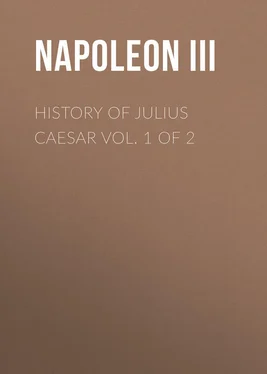Napoleon III - History of Julius Caesar Vol. 1 of 2
Здесь есть возможность читать онлайн «Napoleon III - History of Julius Caesar Vol. 1 of 2» — ознакомительный отрывок электронной книги совершенно бесплатно, а после прочтения отрывка купить полную версию. В некоторых случаях можно слушать аудио, скачать через торрент в формате fb2 и присутствует краткое содержание. Жанр: foreign_antique, foreign_prose, Биографии и Мемуары, на английском языке. Описание произведения, (предисловие) а так же отзывы посетителей доступны на портале библиотеки ЛибКат.
- Название:History of Julius Caesar Vol. 1 of 2
- Автор:
- Жанр:
- Год:неизвестен
- ISBN:нет данных
- Рейтинг книги:5 / 5. Голосов: 1
-
Избранное:Добавить в избранное
- Отзывы:
-
Ваша оценка:
- 100
- 1
- 2
- 3
- 4
- 5
History of Julius Caesar Vol. 1 of 2: краткое содержание, описание и аннотация
Предлагаем к чтению аннотацию, описание, краткое содержание или предисловие (зависит от того, что написал сам автор книги «History of Julius Caesar Vol. 1 of 2»). Если вы не нашли необходимую информацию о книге — напишите в комментариях, мы постараемся отыскать её.
History of Julius Caesar Vol. 1 of 2 — читать онлайн ознакомительный отрывок
Ниже представлен текст книги, разбитый по страницам. Система сохранения места последней прочитанной страницы, позволяет с удобством читать онлайн бесплатно книгу «History of Julius Caesar Vol. 1 of 2», без необходимости каждый раз заново искать на чём Вы остановились. Поставьте закладку, и сможете в любой момент перейти на страницу, на которой закончили чтение.
Интервал:
Закладка:
Yet the war was protracted in the mountains of the Apennine. Tarentum united with the Samnites, the only people who were still to be feared, 191 191 “Eam solam gentem restare.” (Titus Livius, VIII. 27.)
and the Lucanians abandoned the alliance of the Romans; but, in 429, the two most celebrated captains of the time, Q. Fabius Rullianus and Papirius Cursor, penetrated into the country of Samnium, and compelled the enemy to pay an indemnity for the war and accept a year’s truce.
At this epoch, an unforeseen event, which changed the destinies of the world, came to demonstrate the difference between the rapid creation of a man of genius and the patient work of an intelligent aristocracy. Alexander the Great, after having shone like a meteor, and brought into subjection the most powerful kingdoms of Asia, died at Babylon. His fruitful and decisive influence, which carried the civilization of Greece into the East, survived him, but at his death, the empire he founded became in a few years dismembered (431); the Roman aristocracy, on the contrary, perpetuating itself from age to age, pursued more slowly, but without interruption, the system which, binding again the peoples about a common centre, was destined by little and little to secure her domination over Italy first, and then over the universe.
The defection of a part of the Apulians, in 431, encouraged the Samnites to take arms again; defeated in the following years, they asked for the restoration of friendly relations, but the haughty refusal of Rome led, in 433, to the famous defeat of the Furcæ Caudinæ. The generosity of the Samnite general, Pontus Herennius, who granted their lives to so many thousands of prisoners on condition of restoring to force the old treaties, had no effect upon the Senate. Four legions had passed under the yoke – a circumstance in which the Senate only saw a new affront to revenge. The treaty of Caudium was not ratified, and subterfuges little excusable, although approved at a later period by Cicero, 192 192 Cicero, de Officiis , iii. 30.
gave to the refusal an appearance of justice.
Meanwhile the Senate exerted itself vigorously to repair this check, and soon Publilius Philo defeated the enemies in Samnium, and, in Apulia, Papirius, in his turn, caused seven thousand Samnites to pass under the yoke. The vanquished solicited peace, but in vain; they only obtained a truce for two years (436), and it had hardly expired, when, penetrating into the country of the Volsci, as far as the neighbourhood of Terracina, and taking a position at Lautulæ, they defeated a Roman army raised hastily and commanded by Q. Fabius (439). Capua deserted, and Nola, Nuceria, the Aurunci, and the Volsci of the Liris took part openly with the Samnites. The spirit of rebellion spread as far as Præneste. Rome was in danger. The Senate required its utmost energy to restrain populations whose fidelity was always doubtful. Fortune seconded its efforts, and the allies, who had proved traitors, received a cruel chastisement, explained by the terror they had inspired. In 440, 193 193 Titus Livius, IX. 24, 28.
not far from Caudium, a numerous army encountered the Samnites, who lost 30,000 men, and were driven back into the Apennine territory. The Roman legions proceeded to encamp before their capital, Bovianum, and there took up their winter quarters.
The year following (441), Rome, less occupied in fighting, profited by this circumstance to seize upon advantageous positions, establishing in Campania and Apulia colonies which surrounded the territory of Samnium. At the same epoch, Appius Claudius transformed into a regular causeway the road which has preserved his name. 194 194 Diodorus Siculus, XX. 36. – Titus Livius, IX. 29.
The Romans turned their attention to the defence of the coasts and communication by sea; a colony was sent to the isle of Pontia, 195 195 Diodorus Siculus, XIX. 101.
opposite Tarracina, and the armament of a fleet was commenced, which was placed under the command of duumviri navales . 196 196 Titus Livius, IX. 31.
The war had lasted fifteen years, and, although Rome had only succeeded in driving back the Samnites into their own territory, she had conquered two provinces, Apulia and Campania.
Third Samnite war. Coalition of Samnites, Etruscans, Umbrians, and Hernici (443-449).
VI. A struggle so desperate had produced its effect even in Etruria, and the old league was formed again. Inured to war by their daily combats with the Gauls, and emboldened by the reports of the defeat of Lautulæ, the Etruscans believed that the moment had arrived for recovering their ancient territory to the south of the Ciminian forest; they were further encouraged by the attitude of the peoples of Central Italy, who were weary of the continual passing of legions. From 443 to 449, the armies of the Republic were obliged to face different enemies at the same time. In Etruria, Fabius Rullianus relieved Sutrium, a rampart of Rome on the north; 197 197 Diodorus Siculus, XX. 35.
he passed through the Ciminian forest, and by the victories of Lake Vadimo (445) 198 198 Now Lago di Vadimone or Bagnaccio , situated on the right bank and three miles from the Tiber, between that river and the Lake Ciminius, about the latitude of Narni .
and Perusia compelled all the Etruscan towns to ask for peace. At the same time, an army laid waste the country of the Samnites; and a Roman fleet, composed of vessels furnished by the maritime allies, took the offensive for the first time. Its attempt near Nuceria Alfaterna ( Nocera , a town of Campania) was unfortunate.
War next breaks out again in Apulia, Samnium, and Etruria, where the aged Papirius Cursor, named dictator anew, gains a brilliant victory at Langula (445). The year following Fabius penetrates again into Samnium, and the other consul, Decius, maintains Etruria. Suddenly the Umbrians conceive the project of seizing Rome by surprise. The consuls are recalled for the defence of the town. Fabius meets the Etruscans at Mevania (on the confines of Etruria and Umbria), and, the year following, at Allifæ (447). Among the prisoners were some Æqui and Hernici. Their towns, feeling themselves thus compromised, declared open war against the Romans (448). The Samnites recovered courage; but the prompt reduction of the Hernici allowed the Senate to concentrate its forces. Two armies, penetrating into Samnium by way of Apulia and Campania, re-established the old frontiers. Bovianum was taken for the third time, and during six months the country was delivered up to devastation. In vain Tarentum tried to raise new quarrels for the Republic, and to force the Lucanians to embrace the cause of the Samnites. The successes of the Roman arms led to the conclusion of treaties of peace with all the peoples of Southern Italy, constrained thenceforward to acknowledge the majesty of the Roman people. The Æqui remained alone exposed to the wrath of Rome; the Senate did not forget that at Allifæ they had fought in the ranks of the enemy, and, once freed from its more serious embarrassments, it inflicted on this people a terrible chastisement: forty-one places were taken and burnt in fifty days. This period of six years thus terminated with the submission of the Hernici and Æqui.
Five years less agitated left Rome time to regulate the position of its new subjects, and to establish colonies and ways of communication.
The Hernici were treated in the same manner as the Latins, in 416, and deprived of commercium and connubium . Prefects and the law of the Cærites were imposed on Anagnia, Frusino, and other towns guilty of desertion. The cities which had remained faithful preserved their independence and the title of allies (448); 199 199 Titus Livius, IX. 43. – Cicero, Oration for Balbus , 13. – Festus, under the word Præfecturæ , p. 233.
the Æqui lost a part of their territory and received the right of city without suffrage (450). The Samnites, sufficiently humiliated, obtained at last the renewal of their ancient conventions (450). 200 200 Titus Livius, IX. 45. – Diodorus Siculus, XX. 101.
Fœdera non æqua were concluded with the Marsi, the Peligni, the Marrucini, the Frentani (450), the Vestini (452), and the Picentini (455). 201 201 Titus Livius, IX. 45; X. 3, 10.
Rome treated with Tarentum on a footing of equality, and engaged not to let her fleet pass the Lacinian Promontory to the south of the Gulf of Tarentum. 202 202 Appian, Samnite Wars , § vii., p. 56, edit. Schweighæuser.
Интервал:
Закладка:
Похожие книги на «History of Julius Caesar Vol. 1 of 2»
Представляем Вашему вниманию похожие книги на «History of Julius Caesar Vol. 1 of 2» списком для выбора. Мы отобрали схожую по названию и смыслу литературу в надежде предоставить читателям больше вариантов отыскать новые, интересные, ещё непрочитанные произведения.
Обсуждение, отзывы о книге «History of Julius Caesar Vol. 1 of 2» и просто собственные мнения читателей. Оставьте ваши комментарии, напишите, что Вы думаете о произведении, его смысле или главных героях. Укажите что конкретно понравилось, а что нет, и почему Вы так считаете.












